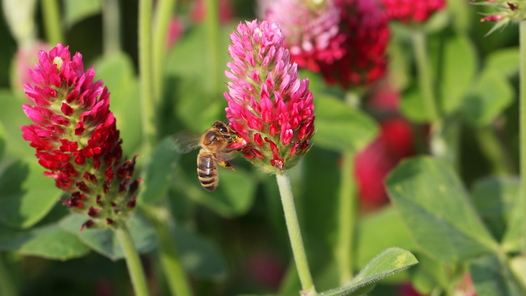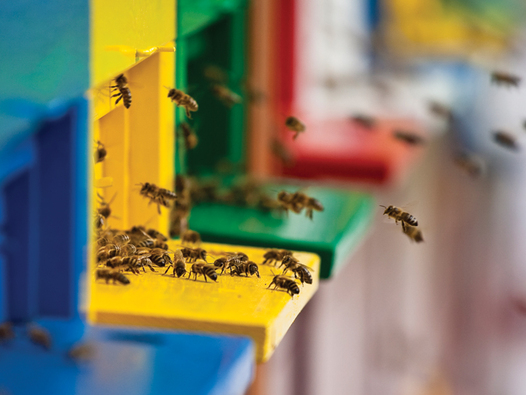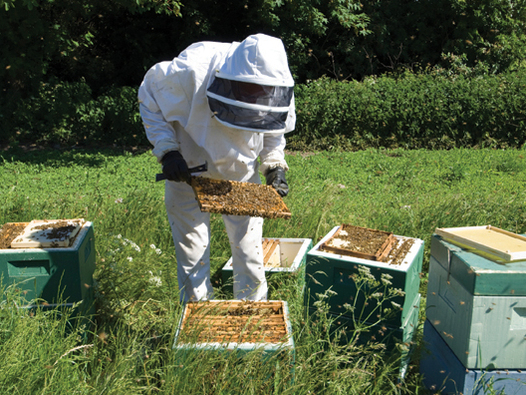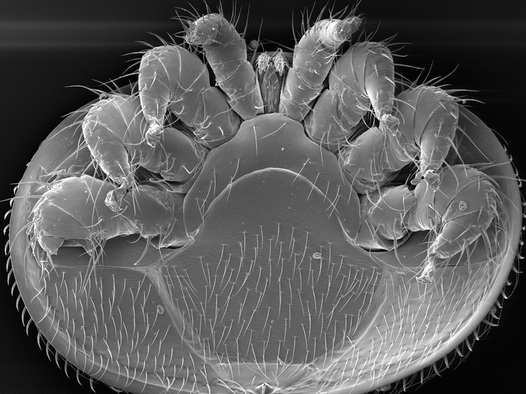The honeybee – the farmer's friend
The honeybee plays a vital role in the pollination of flowering plants, including crops. After all, one-third of the food we eat depends upon pollination, including almonds, apples, berries, cucumbers and melons.
While farmers are dealing with the challenge of providing more food for a growing population, the honeybee has been facing its own problems. The unexplained rise in honeybee deaths - mainly due to high winter losses in colonies in the EU, and 'Colony Collapse Disorder' (CCD) in the USA - has become an issue of concern.
While there has been a 45 percent rise since 1961 in the managed honeybee population worldwide, some beekeepers have experienced serious losses recently in Europe, the US and elsewhere. In the USA adult bees have been disappearing from colonies since 2006; abandoning their queen, their brood, and their food reserves in what has been termed 'Colony Collapse Disorder' (CCD).
Meanwhile, a number of European beekeepers have seen unusually high bee colony losses during over winter periods since the 1990s. Over the period 2002 to 2010, reliable surveys have estimated colony losses at between five and 35 percent, peaking during the 2002/03 winter. To put this in context, losses of around ten percent would previously have been considered normal.
Separately, there have been occasional reports of bee poisoning, caused by people mis-using crop protection products.
BASF acknowledges the important role of the honeybee to farmers and food production and is fully committed to bee health. In everything we do, we will play our part to care for the environment, and leave a positive legacy for future generations.
Interlinked factors
There is a growing belief that a number of factors, including parasites, diseases, nutrition, beekeeping practices, weather patterns and genetics may be combining to challenge the survival of bees. Parasites and viruses can spread easily in today’s highly connected world. Both Varroa destructor (a parasitic mite and vector of viruses) and Nosema spp. (a parasitic fungus) weaken immunity and bee health. As a result, many viruses – previously unknown to have caused symptoms of ill-health in bees – have become fatal.
The limited genetic diversity of honeybees – bred from a limited number of lines to become less aggressive and more productive – may also have affected immunity. For example, it is estimated that the entire honeybee population of the USA can be traced back to 500 queens. Modern farming has also reduced the variety of pollen within the agricultural landscape, impacting bee diet and also immunity.
Commercial beekeepers have to transport hives over long distances. During travel, the bees are confined in close proximity to each other, causing additional stress. Some consider issues like climate change, evident in recent, harsher winters and wetter springs, to be yet other factor. Even the young bees that survive frequently suffer health effects.
A proactive approach
According to the European Food Safety Authority (EFSA) any correlation drawn between the loss of honeybee colonies during winter and the use of pesticides is rare. This is reinforced by independent studies in Germany and France that looked at long-term impacts. However, the industry needs to remain vigilant. BASF works closely with partners to investigate any suspected pesticide impacts as well as helping to stop the misuse of crop protection products.
Did you know?
- There are at least 20,000 species of bees on earth and more than 2,500 in the EU.
- Honeybees typically die of exhaustion about three weeks after first taking flight, having flown about 800 km, sometimes carrying up to half their bodyweight, in foraging for nectar and pollen.
- There are around 700,000 beekeepers in the EU.
- The EU produces around 200,000 tons of honey each year.
- The commercial value of bees' pollination services is estimated at £200m per year in the UK and $14bn in the USA and €153bn worldwide.
Further interesting links
- BEE DOC (Bees in Europe and the Decline Of Honeybee Colonies)
- Project COLOSS (Prevention of COlony LOSSes)
- STEP project (Status and Trends of European Pollinators)
- EurBee European Association for Bee Research (German)
- German bee monitoring (German)
- USDA Bee Research Laboratory
- International Commission for Plant-Bee Relationships
The Varroa mite
The Varroa mite continues to be a major factor affecting bee health. The German bee monitoring project recently published a long-term study, which shows that the Varroa is significantly related to high winter losses in honeybee colonies.
With 'Mite Away™ Quick Strips' (MAQS) BASF and NOD Apiary Products offer a solution to control the Varroa destructor. The product targets Varroa mites while they feed on developing young bees, and stops mite reproduction.





